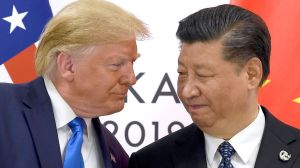In Nepal, PM gets a dictator’s powers
Mercifully, the period in which the interim constitution will be in force is brief. Elections should be completed by June

It was a prolonged exercise that finally gave Nepal an interim constitution. But the document, sadly, makes Nepal’s vision of democracy incomplete and ignores the principle of separation of powers. In fact, during the interim phase of governance that will end in June, if elections to the constituent assembly are held as scheduled, the prime minister will enjoy the powers of an ‘absolute dictator’. Worse, the constitution not only takes away all the immunity the king as head of state had enjoyed and transfers it to the PM, it also empowers the council of ministers to grant amnesty to convicts, regardless of the nature of their crime.
India’s minister of external affairs, Pranab Mukherjee, on his recent visit to Kathmandu, skipped making comments on the interim constitution, which had been finalised a day before his arrival here. It is difficult to say whether he did this out of wisdom or because the constitution was so faulty in itself. In any case he was wise to withhold comments.
Let’s examine the process of appointing the chief justice, judges of the supreme court and other constitutional posts set down by the interim constitution. The appointment of a constitutional council is provided for the purpose, with the PM as its head. The chief justice and the speaker of the interim parliament, besides three ministers nominated by the PM, will be members of this council. And the PM, given the power of the head of state vested in him, will approve the nomination. In the case of appointing the chief justice, the law minister will act as member of the council. In short, the chief justice will be a helpless minority voice in the advocacy of an independent judiciary.
Nepal will remain without a designated head of state as the constitution is silent on it. While the king has been stripped of that status — the fate of monarchy will be decided at the first meeting of the constituent assembly by a simple majority vote — it empowers the PM to discharge all the administrative functions that the head of state was performing.
In fact, Nepal’s transition from an absolute monarchy to an ‘absolute prime ministerial system’ is fraught with risks that will have a direct bearing on the country’s promised move to peace, democracy and development. Koirala, despite his considerable presence thanks to the role he played during the pro-democracy movement, is someone who has on many occasions during his many tenures as PM earlier, acted vengefully and misused the state’s authority to harass rivals. His past is not free of the taint of corruption and his family members are known to act in an extra-constitutional manner. With the constitution legitimising him as a PM with absolute power, will he undergo a transformation? It will also be unfair to expect the PM, essentially a party person, to act in a non-partisan manner while discharging the role of a head of state.
Well-known constitutional experts who have consistently fought for the independence of the judiciary and for fundamental rights have already begun to criticise the interim constitution as an ‘unholy deal’ struck by politically ambitious players.
The interim constitution pledges to end the culture of impunity of the past. It lays the blame for this at the door of the 238-year-old system of monarchy. To fix responsibilities for the excesses, killing and other kind of atrocities witnessed over the past 11 years of conflict, the interim constitution provides for the formation of a truth and reconciliation commission — an idea copied from South Africa. But the very clause that follows smacks of a conspiracy to punish the guilty selectively. “No matter what may have been written here, implementation or absence of it will not be questioned in any court.” Another clause empowers the PM to grant amnesty in any nature of conviction. Which clearly means if anyone from the seven parties and the Maoists is found guilty, he or she will not have to face punishment.
In brief, the interim constitution is ‘of the parties, by the parties and for the parties’. Mercifully, the period during which it will be in force is brief. Elections to the constituent assembly should be completed by June. But this short span could turn out to be a period — backed by the interim constitution — to practise the politics of hatred, intolerance, revenge and impunity, something that goes against the spirit of the project for which Nepal’s people had came out on to the street in droves during those stormy 19 days of popular uprising in April.
While the political parties, including the Maoists, may have won the first round, the people certainly have lost it.
The writer is a senior journalist based in Kathmandu







- 01
- 02
- 03
- 04
- 05
























